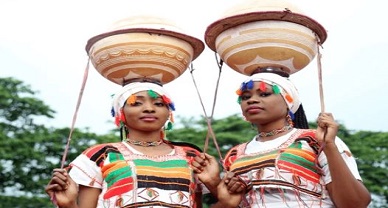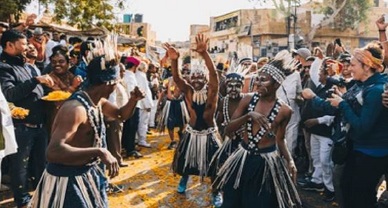How Madhya Pradesh Government Protects Its Tribes From Illegal Conversion?
“Too often, Indian tribes are at the mercy of the shifting political winds of the State government.”
~ Jim Costa
The statement above elucidates succinctly that how tribes of India get treated within our nation. Tribes, their cultures and traditions, their languages, unique scripts, etc., which need to be protected, are all at the mercy of the ruling governments. The Indian Tribes have played a crucial role in the past either we take the instances of revolts against invaders or several uprisings against the Britishers to free the nation to form their clutches. However, their bravery and valour not got that much recognition that they should have. They became an ostracized community, mostly residing in forests away from all necessities and luxuries of the world.
Being an ostracized community, the tribal population became prone to various social and political evils. One of such evils is the religious conversion by providing some materialistic benefits or by persuading someone under the garb of fear and magic or by a forceful method. Tribes residing in Madhya Pradesh are one of the victims of such religious conversions. Thus, taking into account their sufferings, the article attempts to elucidate what is the current situation of religious conversion of tribal people in the state. It also talks about how state governments and authorities have formulated legislation and taken action against the same.
TRIBAL CONVERSION IN MADHYA PRADESH
As per the Census of 1971, there was a 3,64,08,514 Scheduled Tribes population in India, which increased to 10,45,45,716 as per the 2011 Census.[i] The growth of Scheduled Tribes population in this period is 187.1 percent. The majority of the Scheduled Tribes population resides in rural areas of the country. A population of 49,40,258 belonged to various Scheduled Tribes (ST) in Madhya Pradesh which was 13.57 percent of all India tribal population of 1971. The ST population has reached 1,53,16,784 in 2011, registering a growth of 210 percent in the four decades, accounting for nearly 14.65 percent of India.[ii] Moreover, this population nearly accounts for 21.1 percent of the total population of Madhya Pradesh.[iii] Thus, such a huge chunk of the population needs to be taken care of by the state government in the best possible ways to protect their interests as they fall within the category of ‘vulnerable.’
Recently, in 2017, the Madhya Pradesh police arrested ten people for forcefully and through fraud converting tribal children into Christianity. Madhya Pradesh police rescued nearly 71 tribal children, 71 minor children – 39 boys and 32 girls.[iv] According to the then-Home Minister, illegal conversion activities are being carried out on a large scale in the Jhabua and Alirajpur districts of the state and the state government is trying its best to get to the bottom of the racket.[v]
Another instance of Alirajpur district of February 2021, where a Christian priest along with two women was arrested for targeting and inciting families of vulnerable tribals groups to convert into Christianity. The case was lodged against Christian priest Dilip Ransingh Vasuniya. The complaint stated that Vasunia lured the brother of Ikesh, Ishwar Dudwe into accepting Christianity by promising financial help and a motorcycle. Following this, Ishwar stopped following his own religious rituals and started worshiping Jesus.[vi]

Another instance of Madhya Pradesh is of January 2021 where 11 evangelists were booked by the Madhya Pradesh police for forcefully converting the tribal peoples to Christianity.[vii] In the First Information Report (FIR), the tribal girl who was the victim – Shalini, stated that the organizers were forcing her to sit throughout the prayer ceremony in the Christian community hall. She further said, “They told me that now I am under the guidance of Lord Jesus and all my problems and diseases will be resolved. There were many other Hindus who were forced to embrace Christianity.” Moreover, she said, “When I tried to quit the ceremony, they didn’t allow me to do so and claimed that you may have come on your will, but you can’t leave this ceremony on your own will.”[viii]
Such instances depict how Christian missionaries are trying to fraudulently persuade or forcefully threaten the tribal community people to convert into Christianity. The Constitution of India under Article 25[ix] provides everyone the right to profess his/her religion. Moreover, under Article 21,[x] it provides the right to life. Religious traditions and cultures being an intrinsic part of life, play a crucial role in the development and upbringing of an individual. Thus, such instances explicitly infringe these rights guaranteed to each citizen, including the tribal population of India.
STEPS TAKEN BY MADHYA PRADESH GOVERNMENT
Birsa Munda, an Indian tribal freedom fighter, religious leader, and folk hero who belonged to the Munda tribe, was once forcefully converted and admitted to the German Christian school. However, after realising the same, he left the school and again rejoined the mainstream. After that, he shook the British administration, and by playing a crucial role in the freedom movement, he fought for his tribal culture and traditions.[xi] Elucidating the same, CM of Madhya Pradesh Shivraj Singh Chauhan on Tribal Pride Day, addressing a gathering in Bhopal, stated that illegal religious conversion of tribal communities will not be tolerated, and the government of the state have taken and further also take adequate steps to curb the same. He also said. “We need to bring tribal people to the mainstream. The first right over the state’s resources is that of the poor and those at the lowest level.”[xii]
Thus, taking into account all these situations prevailing in the state since the pre-independence era, the state government formulated laws to protect the interests of the tribal population residing in the state. One of such laws that was recently proposed and passed by the state cabinet is the Madhya Pradesh Dharmik Swatantrata (Freedom of Religion) Bill, 2020.[xiii] This bill replaces the 1986 legislation – Madhya Pradesh Freedom of Religion Act – formulated with the same intent to protect the rights, cultures, and traditions of the vulnerable tribal community.
The fresh bill seeks to prohibit religious conversions or an attempt of conversion by means of misrepresentation, allurement, threat, undue influence, coercion, marriage, and any other fraudulent means. The bill provides for one to ten years imprisonment and a maximum fine of one lakh if the conversion was done through the abovementioned methods.[xiv] According to the Home Minister of the state, “The forceful conversions and marriages will be a cognisable offence and non-bailable. There will be a provision for declaring such marriages null and void. Before conversion, the person and religious gurus have to inform district magistrate at least 60 days prior.”[xv]
Further, the bill provides for five-year imprisonment for religious gurus who conduct conversion ceremonies in contradiction with provisions of the legislation. The bill also says “Paitrik Dharm me Wapsi” (return to the father’s religion) will not be treated as conversion.[xvi] For the religious conversion of Scheduled Tribes, the bill explicitly states that the forced conversion of a woman, minor, scheduled caste, and scheduled tribe will attract two to ten years imprisonment and a minimum fine of Rs 50,000.[xvii] Mass forced conversion will attract five to ten years of jail term and a fine of up to one lakh rupees. Moreover, as per the bill, the burden of proof will lie on the accused.[xviii] Such concrete steps by the state government of Madhya Pradesh to protect the tribal communities from illegal religious conversions must be appreciated.
WAY AHEAD
Though the legislation might seem perfect in theory, the herculean task for the government is its implementation. The government infrastructure, as well as mechanisms, fall short in the implementation of such acts. The missionaries conduct their evangelizing campaigns in remote areas where tribal reside in a clandestine manner. This way, they trick state authorities and get succeed in their campaigns. The state government should have also taken care of such instances.
Moreover, sometimes they also bribe the state authorities and flee from the charges imposed upon them. Such instances clearly depict the lacunas in the implementation procedure of the legislation. Thus, the state government should also take care of such instances and formulate concrete provisions that deter others if they act in contrast with the law. The state government should also promote awareness among the tribal communities about the rights that the constitution provides them through online as well as offline advertisements and campaigns.
Thus, such campaigns need to be curbed so that we can protect the tribal culture and tribal communities from getting extinct. There is an urgent need to spread awareness among the tribal people. The state government should come forward to tackle these problems and help tribal communities by striving to make them a part of mainstream society. Only this way we can alleviate the problems of such communities and make them grow.
Author: Kaustubh Kumar, in case of any queries please contact/write back to us via email to chhavi@khuranaandkhurana.com or at Khurana & Khurana, Advocates and IP Attorney.
REFERENCES
[i] 1971 Census Data, Office of the Registrar General & Census Commissioner, India, Ministry of Home Affairs, Government of India.
[ii] 2011 Census Data, Office of the Registrar General & Census Commissioner, India, Ministry of Home Affairs, Government of India.
[iii] Demography of Scheduled Tribes, Government of Madhya Pradesh, available at: http://censusmp.nic.in/censusmp/Data/PCA_DATA/008%20-%20Chapter%20-%206%20-%20ST%20.pdf (Last Visited on May 25 ,2021).
[iv] Hemender Sharma, Madhya Pradesh: 10 booked for trying to convert 71 tribal children to Christianity, India Today (May 23, 2017, 05:27 PM), https://www.indiatoday.in/india/story/madhya-pradesh-religious-conversion-978758-2017-05-23
[v] Id.
[vi] Alirajpur: Christian priest booked for tribals’ conversion, The Free Press Journal (February 08, 2021, 09:17 PM), https://www.freepressjournal.in/indore/alirajpur-christian-priest-booked-for-tribals-conversion
[vii] Kashif Kakvi, MP Police Book 11 for ‘Forcing’ Tribals to Convert to Christianity Under New Anti-conversion Law in Indore, News Click, https://www.newsclick.in/MP-police-book-11-forcing-tribals-onvert-christianity-new-anti-conversion-law-indore (Last Visited on May 25, 2021).
[viii] Id.
[ix] The Constitution of India 1950, Article 25.
[x] The Constitution of India 1950, Article 21.
[xi] Sidharth Yadav, Won’t tolerate religious conversion of tribal people: Shivraj Singh Chouhan, The Hindu (November 16, 2020, 10:25 PM), https://www.thehindu.com/news/national/other-states/wont-tolerate-religious-conversion-of-tribal-people-chouhan/article33106833.ece
[xii] Id.
[xiii] Ravish Pal Singh, MP cabinet approves ‘love jihad law’, forced conversion will invite 10-year-jail term, penalty, India Today (December 26, 2020, 01:32 PM), https://www.indiatoday.in/india/story/mp-govt-okays-freedom-of-religion-bill-against-forced-conversion-1753278-2020-12-26
[xiv] 10 years in jail for offence under MP’s ‘religious freedom’ law, fine up to Rs 1 lakh, India Today (December 06, 2020, 03:29 AM), https://www.indiatoday.in/india/story/10-years-in-jail-for-offence-under-mp-s-religious-freedom-law-1747050-2020-12-06
[xv] Madhya Pradesh Govt Okays Anti-Religious Conversion Bill, Odisha Bytes, https://odishabytes.com/madhya-pradesh-govt-okays-anti-religious-conversion-bill/ (Last Visited on May 25, 2021).
[xvi] Shruti Tomar, Madhya Pradesh conversion law tougher than UP’s, Hindustan Times (December 27, 2020, 03:16 PM), https://www.hindustantimes.com/india-news/madhya-pradesh-conversion-law-tougher-than-up-s/story-6p45HbHvS3gSfa5IOQPR4I.html
[xvii] Shruti Tomar, Madhya Pradesh cabinet okays bill against forced conversions, Hindustan Times (December 26, 2020, 01:33 PM), https://www.hindustantimes.com/india-news/madhya-pradesh-cabinet-okays-bill-against-forced-conversions/story-1mGDJ2T3P0LlfMONc3fPfP.html
[xviii] Ibid. at 15


